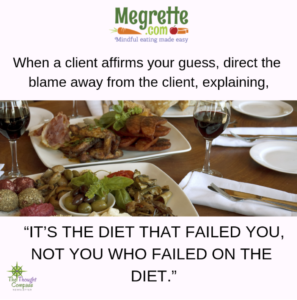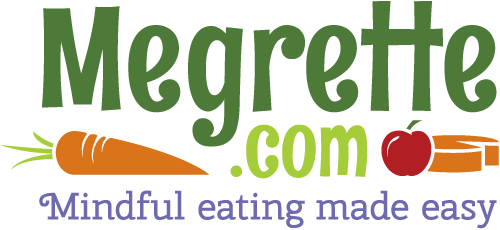 Being nonjudgmental allows you, the professionals, to see the charlatan and separate fact from fiction. You know that the latest health fads lack the necessary research to prove that its effective. The persuasive argument, promising results, are hard to resist if your client believes that it fixes what ails them. Etiquette prevents you from saying, “That isn’t proven! It won’t work!” It is at this moment you realize that the problem with nutritional counseling is threefold. The initial problem is limited research showing that a fad or radical diets aka, dieting, are sustainable or produce weight loss! The second problem is they lead to disordered eating patterns, and the third is knowing how to support your patient’s desire to change their health, body image, food eating without supporting a fad, unsustainable plan or sounding like a negative Nelly?
Being nonjudgmental allows you, the professionals, to see the charlatan and separate fact from fiction. You know that the latest health fads lack the necessary research to prove that its effective. The persuasive argument, promising results, are hard to resist if your client believes that it fixes what ails them. Etiquette prevents you from saying, “That isn’t proven! It won’t work!” It is at this moment you realize that the problem with nutritional counseling is threefold. The initial problem is limited research showing that a fad or radical diets aka, dieting, are sustainable or produce weight loss! The second problem is they lead to disordered eating patterns, and the third is knowing how to support your patient’s desire to change their health, body image, food eating without supporting a fad, unsustainable plan or sounding like a negative Nelly?
Siding with your client’s desire to change can open the door. For example, you could begin the conversation by saying, “After the holidays you want to improve your eating habits.” or “You are looking for a plan to jumpstart your health.” or “You want a clear plan to feel healthier.” If the client affirms these types of statements by saying, “Yes, that is exactly what I need” you might offer a tricker, complex reflection such as siding with the negative that sounds like, “Strict and rigid diet plans have been effective for you” or “Your craving the certainty and limited choices of these radical plans.” to which the client would disagree. If you haven’t had additional motivational interviewing training, it is safer to focus on the underlying doubt, “You suspect that a strict and rigid diet plan will simply set you back on the path of failure.” When a client affirms your guess, direct the blame away from the client by explaining that it is the diet that failed the client, not the client that failed on the diet.
Obtaining permission to share information with the client can open the counseling dialog. Here is an example, “Can I share with you the science why fad diets seem so great but really don’t work?” if the client agrees “Sure, that would be great!” you might share how good research uses large numbers of subjects and demonstrates its effectiveness over time, but fad diets trigger fear and make magical promises to get you to try them.
We Are Like Our Clients
Life offers many parallels and health professionals are influenced by weight centered thinking like our clients. We are unknowing pawns in the 77-billion dollar diet-culture industry, and we are just as vulnerable to the persuasive arguments and pseudoscience produced by the diet industry. Why? We believe that eating nutritious food and moving the body in a kind, and joyful way promotes health. We also believe in self-care, and self-kindness but over time these concepts have been co-opted by expectations, stigma and external rules, aka, diet-culture. If you are wondering, could this be true? Consider that Weight Watchers has changed its name to WW and has chosen Kate Hudson, a spokesperson with a BMI<25, to represent the company. Diet-culture has quietly saturated our profession and influences how we help our clients creating the illusion that dieting is all that we have.
This assumption, that dieting is the only tool in the toolbox is the first place to challenge yourself and your clients. Recognize you remain vulnerable to diet-culture thinking if you believe that there is only one way to health. If you are looking for an opportunity to evaluate your thoughts consider participating in the weight-neutral self-assessment. A fantastic group of professionals created this 13-question weight-neutral self-assessment, and one of its goals is to help you set a course for more in-depth learning. After you complete your self-assessment, you are invited to reflect on your professional growth. Don’t worry, at the end of the self-assessment there are some trusted resources and amazing people to assist you on this journey.
Help your client by offer some non-dieting support and deeper learning between session. Here are a few options:
- Mindful Eating – The Center for Mindful Eating has a new website, and tons of resources for consumers including World Mindful Eating Month, a free Facebook group runs from January 1-31, 2019.
- There are some new mindful eating books on the market which are worth the read. Here is a short list
- Mind to Mouth: A Busy Chick’s Guide to Mindful Mealtime Moments
- The Mindful Eating Workbook by Vincci Tsui RD
- Eat to Love: A Mindful Guide to Transforming Your Relationship with Food, Body, and Life by Jenna Hollenstein RD
- Prediabetes and Diabetes – there is WN4DC.com which provides a curated blog from a weight-neutral professional of resources that target specific questions including
- Does dieting cure diabetes?
- How can a weight-neutral educator help me?
- Confused about carbohydrates?
- Another option is the Am I Hungry? Diabetes and Mindful Eating program. Here your clients can learn about the Mindful Eating Cycle, by visiting the website, reading the book Eat What You Love, Love What You Eat with Diabetes or supplementing your nutritional counseling sessions by suggesting the Am I Hungry? Mindful Eating for Diabetes Online Class
- PCOS – there is Julie Duffy Dillon’s Food Peace course
- A Taste of Intuitive Eating is Christy Harrison mini-course to heal your client’s relationship with food.
- Recommend the book Intuitive Eating.

